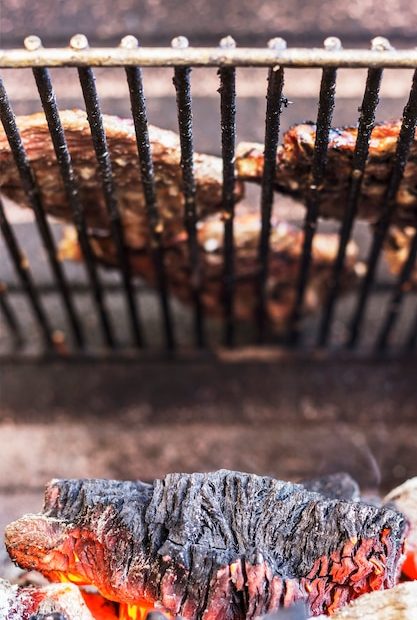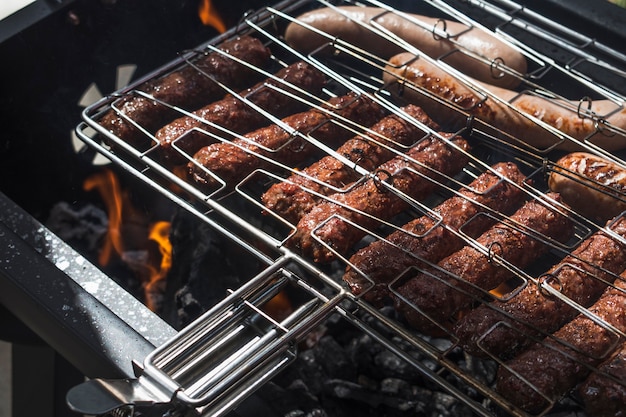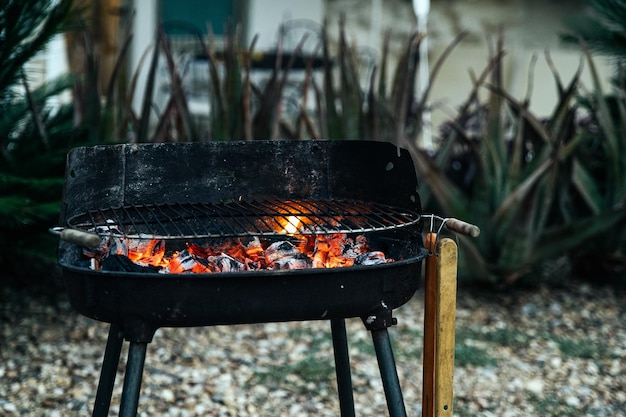Is cooking over charcoal healthy?
Cooking over charcoal has long been a popular method for grilling and barbecuing in the UK. The smoky flavor and charred texture it imparts on food are highly desirable. However, there have been concerns about the potential health risks associated with this cooking technique.
Understanding charcoal grilling
Charcoal grilling involves burning lumps of charcoal or briquettes to generate heat for cooking. As the charcoal burns, it produces smoke and releases various chemicals, including carbon monoxide, polycyclic aromatic hydrocarbons (PAHs), and heterocyclic amines (HCAs).
The potential health risks
Exposing food to these chemicals can pose health risks when consumed in large quantities. High levels of carbon monoxide can be harmful if inhaled, while PAHs and HCAs have been linked to an increased risk of certain types of cancer.
Reducing the risks
While cooking over charcoal may come with some risks, following a few simple steps can help minimize them:
- Choose high-quality charcoal: Opt for natural lump charcoal or briquettes that do not contain additives or additional substances that may release harmful chemicals when burned.
- Preheat the grill: Allow the charcoal to burn for at least 20-30 minutes until it is covered with gray ash before placing the food on the grill. This helps to reduce the emission of potentially harmful chemicals.
- Control the cooking temperature: Avoid flare-ups by controlling the airflow and using a lid to regulate the temperature. This can help prevent the formation of excessive smoke, which contains more harmful compounds.
- Marinate the food: Marinating meat before grilling has been found to reduce the formation of HCAs. Use marinades with herbs, spices, and acidic ingredients like vinegar or citrus juices for better results.
- Trim excess fat: Trim any visible fat from meat as it can drip onto the charcoal, causing flare-ups and the release of potentially harmful substances.
Alternative cooking methods
If you are concerned about the potential health risks of charcoal grilling, there are alternative cooking methods that can still provide delicious results:
- Gas grilling: Gas grills offer a convenient and cleaner alternative to charcoal grilling. They heat up quickly and allow for precise temperature control.
- Electric grilling: Electric grills are another option that eliminates the need for charcoal or gas. They are easy to use, require minimal cleanup, and can be used indoors.
- Oven baking: Baking in the oven is a healthier option as it does not involve direct exposure to smoke or high temperatures.
“While cooking over charcoal may come with some risks, following proper grilling techniques and considering alternative cooking methods can help mitigate potential health hazards.”
In conclusion
Cooking over charcoal can be a flavorful and enjoyable cooking method. However, it is essential to take precautions to reduce the health risks associated with this technique. By choosing high-quality charcoal, preheating the grill properly, controlling the temperature, marinating the food, and trimming excess fat, you can minimize the potential harm caused by the chemicals released during charcoal grilling. If you remain concerned, alternative cooking methods like gas grilling, electric grilling, or oven baking offer a healthier and safer option for cooking your favorite meals.
What is the healthiest charcoal to cook with?
When it comes to cooking with charcoal, choosing the right type can have a significant impact on your health. Many charcoals on the market contain additives, binders, and fillers that may release harmful chemicals when burned. To ensure you’re using the healthiest option, look for natural and sustainable charcoals.
Natural Lump Charcoal
Natural lump charcoal is considered the healthiest option for grilling and smoking. It is made from hardwood such as oak, maple, or hickory, without any additives or chemicals. The production process involves burning wood in a low-oxygen environment, which removes impurities and moisture, leaving behind pure carbon.
Lump charcoal burns hotter and produces less ash compared to briquettes, providing a more authentic grilling experience. It also imparts a unique smoky flavor to your food. However, it burns faster and may require more frequent refueling during longer cooking sessions.
Briquettes made from Coconut Shell
If you prefer the convenience of charcoal briquettes, opt for those made from coconut shells. These briquettes are made from compressed coconut shell charcoal, which is a sustainable and renewable resource. They don’t contain any fillers or chemicals, making them a healthier alternative to traditional briquettes.
Coconut shell briquettes burn longer and produce less smoke, making them ideal for slow cooking or smoking meat. They also provide a consistent heat output, allowing for more precise temperature control while cooking.
“Using natural and sustainable charcoals not only ensures a healthier cooking experience but also reduces your environmental impact.”
To help you make an informed decision, here is a comparison table of the healthiest charcoal options:
| Type | Ingredients | Benefits |
|---|---|---|
| Lump Charcoal | Hardwood (oak, maple, hickory) | Burns hotter, less ash, authentic smoky flavor |
| Coconut Shell Briquettes | Compressed coconut shell charcoal | Burns longer, less smoke, consistent heat |
In conclusion, choosing natural lump charcoal or coconut shell briquettes is the healthiest option for cooking with charcoal. These alternatives are free from additives and chemicals, ensuring that your food remains safe and flavorful. Remember, using natural and sustainable charcoals not only ensures a healthier cooking experience but also reduces your environmental impact.
- Opt for natural lump charcoal made from hardwood for an authentic grilling experience.
- Consider coconut shell briquettes for longer burns and better temperature control.
- Avoid charcoals with additives, binders, and fillers to minimize health risks.
Is it healthy to cook with charcoal?
Many households in the UK enjoy barbecues during the summer months, but there has been ongoing debate about the health implications of cooking with charcoal. Charcoal grilling is a popular method of cooking that imparts a unique smoky flavor to food. However, there are certain factors to consider when using charcoal as a cooking fuel.
Charcoal and carcinogens
One concern associated with charcoal cooking is the potential formation of carcinogenic compounds called polycyclic aromatic hydrocarbons (PAHs) when meat is cooked at high temperatures. These compounds have been linked to an increased risk of cancer. However, there are ways to minimize PAH formation such as avoiding excessive charring and flipping the meat frequently.
Charcoal and air pollution
Cooking with charcoal also releases carbon monoxide and fine particulate matter into the air, which can contribute to air pollution. Using proper ventilation and grilling in open spaces can help reduce exposure to these pollutants.
Healthier grilling practices
To make charcoal grilling healthier, there are several steps you can take. Firstly, choose lean cuts of meat to reduce the amount of fat dripping onto the charcoal. This can help prevent flare-ups and minimize the formation of harmful compounds. Secondly, marinate your meat before grilling. Research suggests that marinating meat can help reduce the formation of PAHs.
Tip: Don’t forget to add some vegetables to your barbecue! Grilling vegetables not only enhances their flavors, but it is also a healthier option compared to charring meat.
Lastly, consider incorporating other cooking methods alongside charcoal grilling. Using a combination of grilling and baking or steaming can help diversify your menu while reducing potential health risks.
Are charcoal briquettes toxic?
Charcoal briquettes are a popular fuel source for barbecues and outdoor grilling. However, there has been some concern about their potential toxicity. Let’s explore whether charcoal briquettes are truly toxic and how to use them safely.
What are charcoal briquettes?
Charcoal briquettes are made by compressing charcoal, typically derived from wood, sawdust, or coconut shells, into uniform shapes. They are then mixed with additives like binders and igniting agents to make them easier to light and burn. These additives can vary between brands.
Potential health risks
While charcoal briquettes contain additives, the level of toxicity depends on the specific brand and composition. Some studies suggest that certain additives used in briquettes can release potentially harmful chemicals when burned, such as carbon monoxide and volatile organic compounds (VOCs).
However, the risks associated with using charcoal briquettes can be minimized by following proper safety measures:
- Use briquettes in well-ventilated areas to reduce the inhalation of harmful fumes.
- Avoid excessive charcoal dust exposure by handling briquettes with gloves.
- Ensure thorough combustion by waiting until the briquettes are fully ignited and covered with ash before cooking food.
Safety tips for grilling with charcoal briquettes
To further enhance safety when using charcoal briquettes for grilling:
- Always follow the manufacturer’s instructions for lighting and use.
- Dispose of used briquettes properly, preferably in a metal container, to prevent accidental fires.
- Consider using natural lump charcoal, which is made solely from wood and contains no additives.
Remember, it’s essential to prioritize safety and follow guidelines when using any type of fuel for grilling or barbecuing.
In summary, while charcoal briquettes may contain additives that can release potentially harmful chemicals when burned, by using them cautiously and in well-ventilated areas, the risks can be minimized. Alternatively, opting for natural lump charcoal can provide a safer grilling option. It’s always wise to prioritize safety when enjoying outdoor cooking activities.
Conclusion
Cooking with charcoal can add a unique taste to your food, but it’s important to be aware of the potential health implications. By adopting healthier grilling practices and taking precautions to minimize exposure to harmful compounds, you can continue to enjoy the experience of cooking with charcoal while prioritizing your health.


